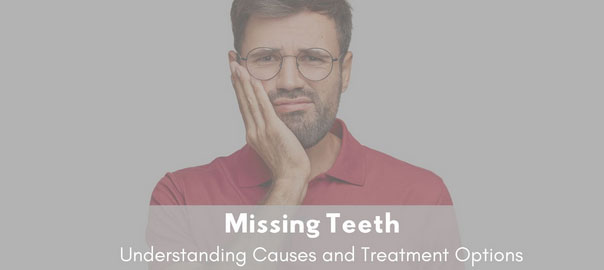
Missing Teeth: Understanding Causes and Treatment options
In some cases, having a few teeth missing can be quite embarrassing and uncomfortable. Sometimes it may be a result of accidents, or tooth decay, among many reasons. The missing tooth in the mouth will minimize oral health and appearance. Do not worry; knowing why your teeth are missing and treatment options will put you in a better position to make an informed decision.
And here, in this post, we explain why our teeth disappear: it is not just by natural aging and trauma but by accidental damage and look at options of treatment. From partial dentures to implants, each pros and cons, and that’s why you are best prepared to make a decision well-suited for your case. Let’s start and take one step closer to a healthier and happier smile!
Reasons of Missing Tooth
There are various causes why a tooth could be missing. From congenital anomalies to trauma, let’s get into many reasons for the missing tooth.
- Dental caries: Caries is one of the most common pathological processes of causing a tooth to be missing. If dental caries, if left unattended, destroy the structure of the tooth and eventually may lead to extraction.
- Periodontal disease: It is a chronic inflammatory condition that involves the supporting structures of the teeth. It causes increased bone loss and further destruction of the connective tissue, thereby, finally leading to the loss of the teeth, if left untreated.
- Dental caries: This can also be considered the poor oral hygiene that would result in dental caries and periodontal disease, which, therefore, remain the two major causes of tooth loss.
- Trauma: avulsion or extrusion/ fracture of the teeth and their supporting structures due to an accident or any form of injury to the oral region.
- Age-related factors: The chronic inflammation, coupled with the presence of risk factors, etc. contributes to a high number of missing teeth at the end of one’s life. Congenital anomalies: There might be congenital or genetic anomalies that cause a number of conditions such as Oligodontia, wherein more than six teeth are absent, or Hypodontia, which indicates 1-6 missing teeth.
- Smoking: The presence of smoking is one of the significant risks that cause periodontal disease which always leads to the loss of teeth.
- Systemic diseases: Other systemic diseases including osteoporosis and diabetes mellitus bring a risk of losing some of your teeth.
Treatment Alternatives
There are various alternatives for a lost tooth. Some of them include a FPD, an RPD, and dental implants. Let’s see more about those:
- Implants: This refers to a titanium post that is surgically placed in the jawbone. Then, once well incorporated with the bone, a crown at the top can be fixed for use as if it were a tooth. This material has been sought after for a long time by individuals desirous of the replacement of the tooth for its claimed extreme durability and look that seems close to a natural tooth.
- Fixed Partial Denture Another term that is used for the dental bridge that replaces one or more missing teeth by a fixed appliance. It is anchored to the adjacent or abutment teeth on both sides of the missing tooth.
- R.P.D. stands for removable partial denture. It is the appliance which can replace one or more missing teeth in the oral cavity. It gets attached in the mouth on either side of a missing tooth by attaching clasps onto the remaining supporting teeth. It is usually made out of acrylic; but it may also be a combination of metal or it may contain both these metals and acrylic materials.
Conclusion
Missing teeth, in general, can indicate an even more far-reaching impacts on one’s health, oral wellbeing, and general wellbeing. Depending on the condition of missing teeth at the moment, one may be limited to carry out his oral functions, such as speaking and chewing, to a degree. Additionally, missing teeth may lead to the tilting of remaining teeth, loss of bones, and inadequate self-confidence from the patient.
Therefore, the hollow inside their jaw due to missing teeth is being replaced with suitable dental treatments like implants or bridges so that these people do not get any further difficulty in maintaining oral health. Ultimately, they would be able to maintain their oral cavity properly as well as improve their quality of life.
References:
- https://www.healthline.com/health/dental-and-oral-health/missing-teeth
- https://www.colgate.com/en-us/oral-health/mouth-and-teeth-anatomy/congenitally-missing-teeth-what-are-they
- https://www.health.harvard.edu/newsletter_article/two-options-for-replacing-lost-teeth
- https://www.ncbi.nlm.nih.gov/pmc/articles/PMC4201933/
Leave a Reply
Leave a Reply
Explore More Similar Posts
Explore More Blogs


Leave a Reply